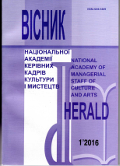СИНЕРГЕТИЧНИЙ ДИСКУРС КУЛЬТУРОТВОРЧИХ ПРОЦЕСІВ У СУЧАСНІЙ УКРАЇНІ
DOI:
https://doi.org/10.32461/2226-3209.1.2016.138473Ключові слова:
дискурс, культурологія, синергія, регіон, культурний континуум України, гуманітарна стратегія, культуротворчі процеси, проекти НАКККіМ,Анотація
У статті визначається синергетичний підхід до дослідження культуротворчих процесів сучасної України, виявляються синергійні шляхи соціокультурного розвитку регіонів України. Проаналізовано поняття «історичнапам’ять" та її значення в процесі забезпечення спадкоємності та формування ідентичності. Механізм відтворення історичної пам’яті покладений в основу гуманітарних проектів НАКККіМ, використовується в процесі репрезентацій історії культури України. Як результат проведених досліджень проблем синергії культурних регіональних ідентичностей України запропоновано ієрархічну модель формування загальнонаціонального культурного простору. Наведено приклади реалізації синергетичного підходу до культуротворчих процесів, що сприяють включенню культури України у світовий контекст. Розкривається ідея синергії української культури з урахуванням діалектики регіональних хронотопів і загальних закономірностей виникнення, розвитку, трансформації окремих етнонаціональних спільнот, регіонів, локальних місцевостей та їх полілогічного об’єднання у цілісний культурний континуум України.
##submission.downloads##
Опубліковано
Номер
Розділ
Ліцензія
Автори, які публікуються у цьому журналі, погоджуються з наступними умовами:
1. Автори залишають за собою право на авторство своєї роботи та передають журналу право першої публікації цієї роботи на умовах ліцензії Creative Commons Attribution License International CC-BY, котра дозволяє іншим особам вільно розповсюджувати опубліковану роботу з обов'язковим посиланням на авторів оригінальної роботи та першу публікацію роботи у цьому журналі.
2. Автори мають право укладати самостійні додаткові угоди щодо неексклюзивного розповсюдження роботи у тому вигляді, в якому вона була опублікована цим журналом (наприклад, розміщувати роботу в електронному сховищі установи або публікувати у складі монографії), за умови збереження посилання на першу публікацію роботи у цьому журналі.
3.Політика журналу дозволяє і заохочує розміщення авторами в мережі Інтернет (наприклад, у сховищах установ або на особистих веб-сайтах) рукопису роботи, як до подання цього рукопису до редакції, так і під час його редакційного опрацювання, оскільки це сприяє виникненню продуктивної наукової дискусії та позитивно позначається на оперативності та динаміці цитування опублікованої роботи.

